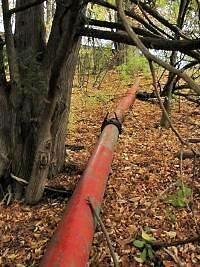|
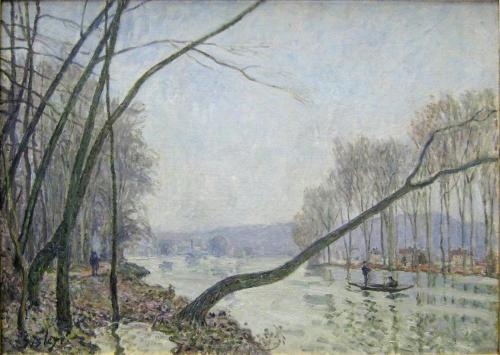
The Banks of the Seine in Autumn
Alfred Sisley
b. October 30, 1839
_______________________
Six poems from Charms by Paul Valéry
Written by Paul Valéry
Translated from the French by Nathaniel Rudavsky-Brody
The Faux Death
Paul Valéry
b. October 30, 1871
Humble, tender, against the charming tomb,
Unfeeling monument
That out of shadows, leavings, offered love
Conjures your weary grace,
I fall, dying against you, dying — Yet,
No sooner fallen across the low grave
Whose lawn littered with ashes summons me,
Life reawakens in her seeming death;
She shakes, reopens lambent eyes, and bites,
And wrenches from my chest still other deaths
Dearer than life.
_______________________
Another Night in the Ruins
Galway Kinnell
1927 – 2014
(....)
2
Nine years ago,
in a plane that rumbled all night
above the Atlantic,
I could see, lit up
by lightning bolts jumping out of it,
a thunderhead formed like the face
of my brother, looking down
on blue,
lightning-flashed moments of the Atlantic.
3
He used to tell me,
“What good is the day?
On some hill of despair
the bonfire
you kindle can light the great sky—
though it’s true, of course, to make it burn
you have to throw yourself in ...”
4
Wind tears itself hollow
in the eaves of these ruins, ghost-flute
of snowdrifts
that build out there in the dark:
upside-down ravines
into which night sweeps
our cast wings, our ink-spattered feathers.
5
I listen.
I hear nothing. Only
the cow, the cow of such
hollowness, mooing
down the bones.
...(more)
_______________________

photo - mw
_______________________
Correlationism
Larval Subjects
(....)
Within correlationism, the beings of the world are treated as screens upon which we project ourselves. These are strange projections because we don’t experience them as issuing from us, but as being properties of the entity itself. The critical and philosophical task thus becomes one of recovering these meanings, of showing how they structure our relationships to entities, of showing how they issue from us, of showing how they are constructed by us. I hasten to add that these are valuable projects that should not be abandoned. The point is not to abandon these modes of analysis, but to broaden the modes of analysis open to us.
If realism has any critical significance, then perhaps it lies in asking what entities contribute as the entities that they are independent of any meanings we might attribute to them. What do entities do– not what do they mean –and above all, how do they affect us and our social relations? How do they modify, by virtue of what they are, our ways of doing, acting, and relating to one another in the world? ...(more)
_______________________
Utopia or Hell: The Future as Posthuman Game Strategy
S.C. Hickman
As I was thinking through the last chapter in David Roden’s posthuman adventure in which a spirit of speculative engineering best exemplifies an ethical posthuman becoming – not the comic or dreadful arrest in the face of something that cannot be grasped , I began reading Arthur Kroker in his book Exits to the Posthuman Future, who in an almost uncanny answer to Roden’s plea for new forms of thought – to prepare ourselves for the posthuman eventuality, tells us that we might need a “form of thought that listens intently for the gaps, fissures, and intersections , whether directly in the technological sphere or indirectly in culture, politics, and society, where incipient signs of the posthuman first begin to figure.” We might replace the use of the word “figure” with Roden’s terminological need for an understanding of “emergence”.
(....)
As Kroker will admonish we seem to be on the cusp of a strange transition, situated at the crossroads of humanity, and the future presents itself now as a gigantic simulacrum of the recycled remnants of all that which was left unfinished by the coming-to-be of the technological dynamo – unfinished religious wars, unfinished ethnic struggles, unfinished class warfare, unfinished sacrificial violence and spasms of brutal power, often motivated by a psychology of anger on the part of the most privileged members of the so-called global village. The apocalypse seems to be coming our way like a specter on the horizon, not a grand epiphany of events but by one lonely text message at a time. (Kroker, 193)
...(more)
_______________________
Exits to the Posthuman Future
Arthur Kroker
google books
_______________________

Evening in Moret, End of October
Alfred Sisley
1888
_______________________
The Posthuman and the Information Guerrilla
Deterritorial Investigations Unit
(....)Yesterday’s template for derive is today’s algorithmic architecture, and the language of our intellectual escapes is that of data. The post-postmodern metropolis is a smartcity awash in the Internet of Things, where absolute freedom is the universality of control. Every utopia is someone’s dystopia, and vice-versa.
(....)
Today’s dark precursor to the posthuman is the Mathematical Man, who is in movement whenever the individual becomes an active participant in their exploitation, whenever he or she gleefully triggers the data flows of production and consumption, whenever they find that the rational flexibility of post-Fordism, neoliberalism, democracy, whatever you want to call it, is the pinnacle of expression and the peak of experience. The Information Guerrilla, by contrast, is out on a derive in the digital architecture (regardless of whether or not it is bathed in the blue glow of the computer screen or the light of the sun), looking for tools, elements to destabilize, channels to subvert, open up, leech, make leak. The Information is on a quest for the ludic. It is a noise machine. As Michel Serres said, “Noise against weapon. Noise is a weapon that, at times, dispenses with weapons. To take up space, to take place, that is the whole point… And noise occupies space faster than weapons can.”
...(more)
Informatic Guerrilla Warfare

photo - mw
_______________________
Zoning outward
Ray Davis
Pseudopodium
Even the most immersive consumption bleeds into the world. We exit the movie theater and blink at the street's new lights. We close the book and reconsider the motives of our nearest and furthest.
And likewise on the production side we sometimes take our immersion out of its cone of isolation for a walk.
Of course, it may decide to interrupt the real-world just as rudely as the real-world interrupts the Zone. We're trying to take a break, take care of business, reconnect, recenter, while the unresolved worries at us like a bone spur.
But it doesn't always drag us back to the kennel. Our evil darlings might instead prefer to scavenge and mark, most ravenously among the village-explainers: systematizing philosophers, psychologists, fundamentalists, essentialists, political and conspiracy theorists, and so on. ...(more)
_______________________
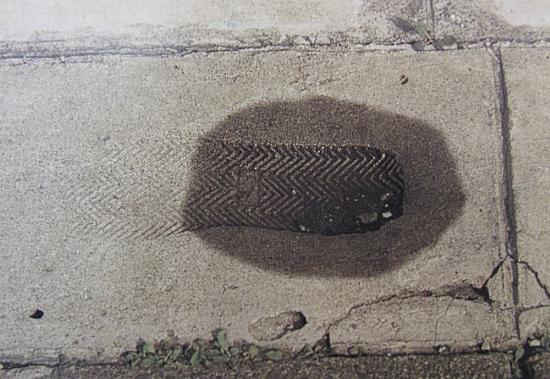
Genpei Akasegawa
1937 - 2014 R.I.P Genpei Akasegawa
Vitro Nasu
_______________________
Geert Lovink on Bifo, Dark Media, and Resistance
Deterritorial Investigations Unit
(....)
Berardi’s study fits into the recent turn from the Joyous to the dark Deleuze. As the Anarchist Without Content blog puts it: “those who knew Deleuze consistently note his firm commitment to joyful affirmation and his resentment of negativity. Beatifying this sentiment, Deleuze has been used to establish a canon of joy. But what good is joy in this world of compulsive positivity?” According to its author, Andrew Culp, it is “time to move from the chapel of joy to the darkness of the crypt.” Many of the characteristics of Dark Deleuze also count for Berardi. The overall task of ‘destroying worlds’ can be exemplified here with collapsing financial markets, epidemics as signs of failing health care, crumbling infrastructures, lacking social services due to budget cuts and environmental degradation. The word ‘mutation’ often appears in the thesis. The same can be said of elements and movements such as withdrawal and old autonomist motives such as the interruption. The politics here is cataclysmic, not molecular.
...(more)
_______________________
Fetishizing Copies
Jessica Litman
Abstract:
The most important reason we have copyright laws is to encourage authors to create new works and communicate them to the public. The most important reason we want them to do that is because we hope that people will read the books, listen to the music, see the art, watch the films, run the software, and build and inhabit the buildings. That is the way that copyright promotes the Progress of Science. Recently, that not-very-controversial principle has collided with copyright owners’ conviction that they should be able to control, or at least collect royalties from, all uses of their works. That's never been true in fact or law, but representatives of copyright owners have gotten used to arguing that it should be true. A particularly ill-considered manifestation of this conviction is what I have decided to call copy-fetish. This is the idea that every appearance of any part of a work anywhere should be deemed a “copy” of it, and that every single copy needs a license or excuse, whether or not anyone will ever see the copy, whether or not the copy has any independent economic significance, whether or not the so-called copy is incidental to some other use that is completely lawful. In this chapter, I focus on two well-known instances of copy-fetish: the contention that any appearance of a work or part of a work in the random access memory of a computer or other digital device is an actionable copy, and the assertion that the copyright statute’s distribution to the public right encompasses possession of any copy that is publicly accessible. Both arguments have their inception in difficult-to-justify court of appeals decisions, which were then embraced by copyright owners as tools to expand secondary liability. Neither one makes much sense on its own terms. The political economy of copyright, however, makes it overwhelmingly likely that any comprehensive copyright revision bill will incorporate both of them. That makes it imperative to recognize readers’, listeners’ and viewers’ copyright liberties expressly, and to protect them with explicit statutory provisions.
social science research network
_______________________

photo - mw
_______________________
Orchestrating Translations: The Case of Murakami Haruki
Irmela Hijiya-Kirschnereit
(....)
How will adaptations for local readerships in all the different translations of his books be approached when the English versions no longer serve as the master copies? Or has Murakami perhaps adapted his style of writing for a global market in a way that makes these adaptations no longer necessary? This is one of the many fascinating questions which will inspire research of scholars of Japanese literature and of translation studies. It is worth noting that the overall rate of direct versus indirect translation via English and a few other languages into German has in fact remained fairly stable since 1868 through the present, amounting to 88% versus 12%. Indirect translations today mostly apply to manga and to popular literature, including crime and mystery novels. We must consider how to appraise these figures, to compare them with translations into other languages, and to relate them to our case in point.
...(more)
via the Literary Saloon
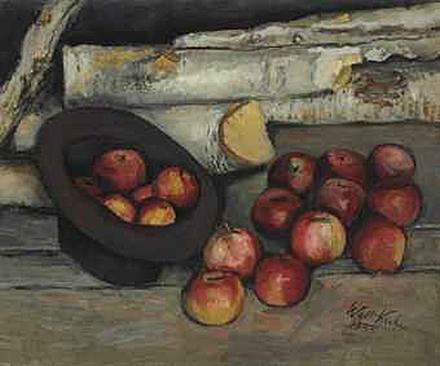
Walt Kuhn
b. October 27, 1877
_______________________
78
Op. posth. no. 1
Darkened his eye, his wild smile disappeared,
inapprehensible his studies grew,
nourished he less & less
his subject body with good food & rest,
something bizarre about Henry, slowly sheared
off, unlike you & you,
smaller & smaller, till in question stood
his eyeteeth and one block of memories
These were enough for him
implying commands from upstairs & from down,
Walt’s ‘orbic flex,’ triads of Hegel would
incorporate, if you please,
into the know-how of the American bard
embarrassed Henry heard himself a-being,
and the younger Stephen Crane
of a powerful memory, of pain,
these stood the ancestors, relaxed & hard,
whilst Henry’s parts were fleeing.
John Berryman, His Toy, His Dream, His Rest - 308 Dreamsongs
Farrar, Straus and Giroux, 1968
_______________________
Happy 100th birthday, John Berryman
Sam Leith
(....)
Berryman is (relatively) unusual among poets because he’s funny. Daniel Swift, who has edited some handsome centenary reissues of Berryman’s work for Farrar, Straus & Giroux in the US (Faber, feebly, isn’t marking the occasion in the UK), suggests that his status as a minor major poet – his not quite getting his due – is in part down to this. People still don’t think funny poets are as important as the non-funny kind. But Berryman is the proper sort of funny: the funny that is involved with heartbreak. His friend Lowell called him a “great Pierrot … poignant, abrasive, anguished, humorous” – and that seems to me an unimprovable description of the mix. The Dream Songs is a slapstick Book of Job.
...(more)
via Languagehat
_______________________

Atelier Corneille
Dirk de Herder
1946-01
_______________________
“In All Them Time Henry Could Not Make Good”: Reintroducing John Berryman
David Wojahn
blackbird
I.
“The high ones die, die. They die. You look up and who’s there?”—so writes Berryman’s alter ego, Henry, at the start of “Dream Song #36,”a poem which is ostensibly an elegy for William Faulkner. Berryman is writing in the early 1960s, when the High Ones, all the heroes of literary modernism as well as a sadly large percentage of the poets of the generations following them, were passing fast and furiously. This makes parts of Berryman’s masterwork seem less like a poem suffused with elegy than an obit page with its syntax roughened up and fashioned into six-line stanzas. Henry makes note of every death, and he has to work hard to keep up: Frost is eulogized in the Dream Song which follows, and later Williams and Eliot. And soon the bodies of Berryman’s contemporaries start to pile up: Plath, Roethke, MacNeice, and most notably his friends Delmore Schwartz and Randall Jarrell. And though they are High Ones, they tend to die pointlessly and ingloriously. Plath gets her gas jet going; Jarrell springs in front of a passing sedan; Roethke’s heart stops during a boozy dive into his neighbor’s swimming pool, and Schwartz’s in a flophouse hallway, his body unidentified for days. Die, die, die: Berryman’s repetitions not only underscore the benumbing frequency of the High Ones’ demises, but also remind us that poets are often bestowed with the dubious blessing of dying more than once, just as Henry does, several times, over the course of The Dream Songs’ 385 sections.
Crucial poets are supposed to be immortal, but we’ve known for quite some time that they’re not. Reputations ebb and flow; the patient goes into cardiac arrest, and it takes a while for the ICU staff to hustle the paddles out and administer the electrical current. Sometimes it seems that the patient will never revive. Donne was a dead horse for three hundred years, and there was a time—a fairly long time, given the relative shortness of American literary history—when Dickinson and Whitman were regarded as quaint eccentrics, by no means among the crucial poets. And on the ICU for Literary Reputations, John Berryman has languished for a couple of decades. Some of his ward-mates have already been wheeled to the morgue. Big Shots of yesteryear, ranging from Conrad Aiken to Anne Sexton and Richard Hugo, are all lying cold on the slabs downstairs. Several of Berryman’s pals are down there too, among them Schwartz and Jarrell. True, there have been some surprising recoveries—who would have thought that Amy Lowell and Edna St. Vincent Millay were anything but goners? Yet now they’re both up and about, subjects of new biographies and selections bearing the august imprint of the Library of America. Berryman, however, does not look to be leaving soon. His breathing is labored, his vitals weak.
...(more)
_______________________

Dirk de Herder
(1914 - 2003) via (OvO)
_______________________
The Silence of the Masses Could Be Social Media
Rob Horning
(....)
It may be a gross distortion of what Baudrillard actually was trying to say, but I find it useful to think of Big Data and predictive analytics every time Baudrillard starts talking about simulation and deterrence. We are “deterred” or steered into certain ranges of behavior by the way reality is mediated to us (“simulation”) based on predictive analytics, recommendation engines, filter bubbles, and so on. In “The Masses: The Implosion of the Social” Baudrillard describes this with unusual clarity:
This is our destiny, subjected to opinion polls, information, publicity, statistics: constantly confronted with the anticipated statistical verification of our behavior, absorbed by this permanent refraction of our least movements, we are no longer confronted with our own will. We are no longer even alienated, because for that it is necessary for the subject to be divided in itself, confronted with the other, contradictory. Now, where there is no other, the scene of the other, like that of politics and society, has disappeared. Each individual is forced despite himself into the undivided coherency of statistics. There is in this a positive absorption into the transparency of computers, which is something worse than alienation.
To me that sounds a lot like the combination of social media and Big Data: Surveillance and quantification produce the self as a set of statistics, a manipulatable data object. Baudrillard says this is “worse than alienation”; in the past, I’ve called this condition “postauthenticity.” Rather than capturing “our own will,” it circumvents it; it predicts what we want without our willing anything. Even if the prediction is initially wrong, preferential placement in the platform, and the efficacy of the subsequent feedback loops can make it so, as David Auerbach points out in this essay on the recent Facebook and OKCupid experiments. Postauthenticity (social media plus Big Data) makes our will superfluous.
...(more)
_______________________

Walt Kuhn
_______________________
Zizek & Deleuze: On Desire
S.C. Hickman
Dark Ecologies
Of late I’ve been tracing down the two forms of desire that interplay through much of the past two-hundred years in discourse. I was rereading Zizek who is a student and epigone of Lacan/Hegel who both conceived desire as lack, while Deleuze on the other hand conceived desire as fully positive. I had discovered in Nick Land’s works this same sense of desire as in Deleuze. There is this undercurrent of philosophers that seem to battle between these conceptions of desire as if it were a central trope and mask for aspects of drive and energy that those following the transcendental Idealists despise with a passion. I’m just taking a few notes here and there as I trace this strange battle of the philosophers over conceptions of desire. It seems important.
...(more)

photo - mw
_______________________
Sojourns in the Parallel World
Denise Levertov
b. October 24, 1923
We live our lives of human passions,
cruelties, dreams, concepts,
crimes and the exercise of virtue
in and beside a world devoid
of our preoccupations, free
from apprehension--though affected,
certainly, by our actions. A world
parallel to our own though overlapping.
We call it "Nature"; only reluctantly
admitting ourselves to be "Nature" too.
Whenever we lose track of our own obsessions,
our self-concerns, because we drift for a minute,
an hour even, of pure (almost pure)
response to that insouciant life:
cloud, bird, fox, the flow of light, the dancing
pilgrimage of water, vast stillness
of spellbound ephemerae on a lit windowpane,
animal voices, mineral hum, wind
conversing with rain, ocean with rock, stuttering
of fire to coal--then something tethered
in us, hobbled like a donkey on its patch
of gnawed grass and thistles, breaks free.
No one discovers
just where we've been, when we're caught up again
into our own sphere (where we must
return, indeed, to evolve our destinies)
--but we have changed, a little.
Denise Levertov feature
edited by John Tranter Jacket 36
_______________________
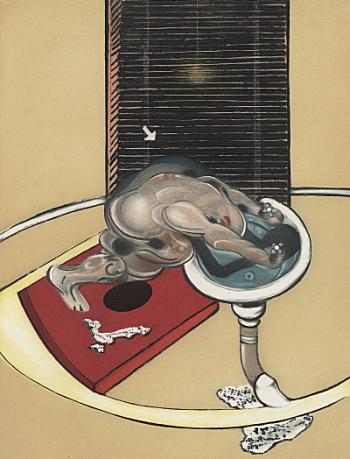
Figure at a Washbasin
Francis Bacon
1976
_______________________
Gilles Deleuze, Francis Bacon: The Logic of Sensation
Arkava Das
entroopy
... when did we start speaking? The drama, the athletics of the Figure, the autopoeisis of the body, aren’t these already there, even before we tried establishing communication? In the triptych of rhythms in the body, outside the body and on the canvas, beyond our control and therefore within our gaze? Are we communicating? Having a conversation, talking more urgently into our palms, every gesture substantiated by a voice that we give in to more and more, that arrives with a distinct pause, that we trust more and more? A suggestion. Have a conversation with a friend you trust, call him up on his phone as he sits across from you, look each other in the eyes, and talk to each other, keeping both corridors open. Both eyes and ears. The one coming out of the phone always wins you over. Soup of senses and forces always trickling to the dark side of surveillance.
I open the book at any page and always there is this relentless stream of interrogation. Especially when I am alone. It is never the same book twice.
...(more)
_______________________

photo - mw
_______________________
from Mappa Mundi
Philip Gross
In the land of mutual rivers,
it is all a conversation: one flows uphill, one flows down.
Each ends in a bottomless lake which feeds the other
and the boatmen who sail up, down, round and round
never age, growing half a day older, half a day younger
every time... as long as they never step on land.
...
In the land of hot moonlight
the bathing beaches come alive at midnight.
You can tell the famous and rich by their silvery tans
which glow ever so slightly in the dark
so at all the best parties there's a moment when the lights go out
and you, only you, seem to vanish completely.
...
In the land where nothing happens twice
there are always new people to meet;
you just look in the mirror. Echoes learn to improvise.
So it's said... We've sent some of the old
to investigate, but we haven't heard yet. When we
catch up with them, we might not know.
_______________________

photo - mw
_______________________
From Vocable
Philip Gross
for JKG
Ninety now, you’re adrift on the vowel-stream,
the crisp edge of all your five languages gone
and we’re back to the least of language. It’s all one,
your, his or my slight modulations of the bare
vowel of animal need . . . though even there
how they give us away, our vowel sounds:
class, place, family secrets, the wrong
school or side of the blanket or overstayed
visa, let slip, between one consonant
and the next.
Erect
a fence of plosives, dentals and fricatives
as we will . . . in times of war and weather
we can’t stem the vowel-flood; it will swell,
barely articulate. No border can contain it;
it will seep, erode, find
cracks; it will break through.
Philip Gross
From: Deep Field
Publisher: Bloodaxe, Tarset, 2011
Philip Gross's top 10 writings from the edge of language

photo - mw
_______________________
The Loop: Ottawa
by Stefanie Bennett
The situation is not customary - Still, allow just one
Frame-frozen
Soulful note into
The spectrum
Of an abbreviated
Insurgency where
Algebra's
Misfired
And the atypical
Self
Rides shotgun.
reposted from The New Verse News
_______________________
The half-life of disaster
The world's media-driven nerves quickly move from shock to vague foreboding and 'disaster capitalism' surges on
Brian Massumi
(....)
What is the half-life of disaster in today's global media? At most two weeks. The suffering on the ground continues, and will continue for decades. World attention quickly shifts elsewhere. The Tohoku earthquake and tsunami were soon displaced from media attention by a next unforeseen shock: upheaval in Libya. This progression is familiar by now. Hurricane in Louisiana, tsunami in the Indian Ocean, flooding in Germany, flooding in Pakistan, fires in Greece, earthquake in Haiti. Terrorist attacks in New York, Madrid, London, Moscow.
Natural disaster and terrorism define the poles of disaster. In between stretches a continuum of disaster, a plenum of frightful events of infinite variety, at every scale, coming one after the other in an endless series. The media plays its role of affective conversion with a regularity that is as predictable as each event in the series, taken separately, is shockingly unforeseen. First the affective strike of the event is instantaneously transmitted, cutting a shocked-and-awed hole of horror into the fabric of the everyday. The ability to make sense of events is suspended in a momentary hiatus of humanly unbearable, unspeakable horror. Then comes the zoom-in to the human detail. Stories get human traction. The horror is alloyed, its impact archived. Another event has been affectively conveyed with irruptive, interruptive force, only to subside into the background of everyday life. What remains is a continuous, low-level fear. This fear doesn't stand out clearly as an emotion. It is more like a habitual posture, an almost bodily bracing for the next unforeseen blow, a tensing infusing every move and every moment with a vague foreboding. This trace-form anticipation – this post-shock pre-posturing – becomes the very medium of everyday life. The environment of life is increasingly lived as a diffuse and foreboding "threat environment". It is almost a relief when the next hit comes. It is only another bout of disaster that will enable the narrative balm to calm again the collective nerves of a humanity permanently on low-level boil.
...(more)
_______________________

René Burri
1933 - 2014
_______________________
Irina Maximova
Translated by Maria Khotimsky
One can also define the past through photographs:
Photographs capture the moments of hope.
People are walking hand in hand,
we think they are - a couple
or that they are - happy.
On some photographs
things exist that have never happened,
and that which will never be
looks like the past.
These unfortunate photographs
can be hidden from future wives.
Because we are all - alive,
and we are all - people,
and no one is here to protect us.
Unseen by each other.
* * *
...(more)
Twenty-first Century Russian Poetry
Edited by Larissa Shmailo
big bridge
_______________________
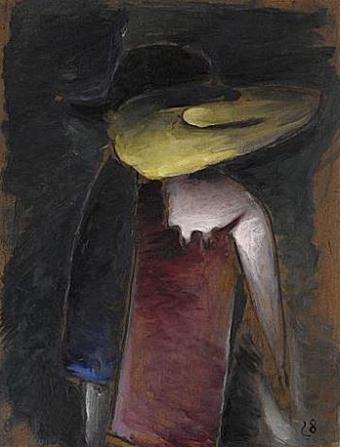
Das Paar
1928
Werner Scholz
b. October 23, 1898
_______________________
Phrenomenology: Zahavi, Dennett and the End of Being
R. Scott Bakker
Three Pound Brain
(....)
The structure that phenomenology best explains. For anyone who has spent long rainy afternoons pouring through the phenomenological canon, alternately amused and amazed by this or that interpretation of lived life, the notion that phenomenology is ‘mere bunk’ can only sound like ignorance. If the structures revealed by the phenomenological attitude aren’t ontological, then what else could they be?
This is what I propose to show: a radically different way of conceiving the ‘structures’ that motivate phenomenology. I happen to be the global eliminativist that Zahavi mistakenly accuses Dennett of being, and I also happen to have a fairly intimate understanding of the phenomenological attitude. I came by my eliminativism in the course of discovering an entirely new way to describe the structures revealed by the phenomenological attitude. The Transcendental Interpretation is no longer the only game in town.
...(more)
via —synthetic_zero
_______________________
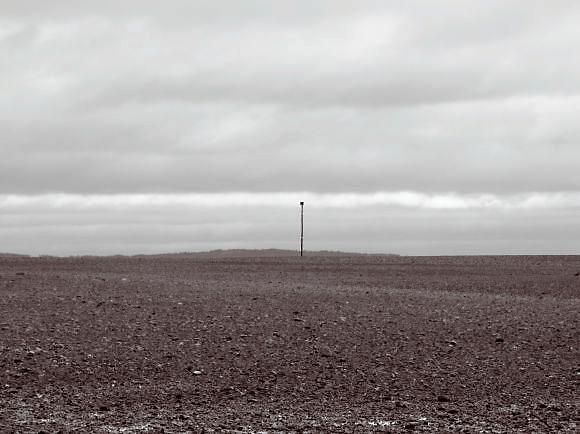
tidepole
Bay of Fundy
photo - mw
_______________________
Occupy Precarity [pdf]
Sanford F. Schram
published in Theory & Event, 16, 1 (March 2013)
Judith Butler has theorized “precarity” as a fundamental condition of life and applied it to Occupy Wall Street. In this essay, I underscore the political significance Butler attaches to precarity in uniting diverse individuals experiencing the subjectivation associated with what Michel Foucault calls “neoliberal governmentality,” where people come to be identified as failing to successfully rely on their human capital in a market-centered society. I argue that precarity is not just a philosophical abstraction but an actually existing discursive practice operant in movement politics in recent years and serving as what Michael Shapiro calls an “action framework” constitutive of the people being represented by Occupy. I suggest that Occupy’s representation of precarity enacted via street theater performs a politics of spectacle consistent with the role of protest movements in the broader political process. We can see this once we integrate Butler’s work with the insights of Frances Fox Piven and Richard Cloward.
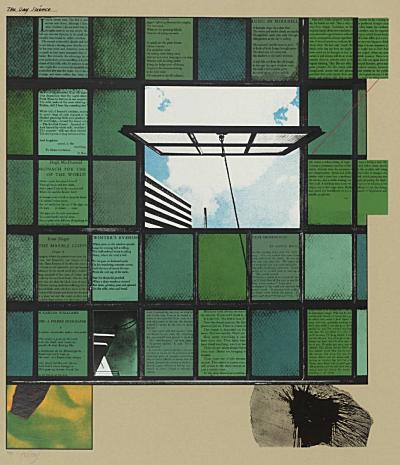
The Gay Science
1965
R. B. Kitaj
d. October 21, 2007
_______________________
category mistakes
Richard Marshall interviews Ofra Magidor
3:am
Ofra Magidor knows her days are not numbered but ochre underneath and that she’s the philosopher working out whether that is really true or not. She’s always thinking about category mistakes and about their two camps, about their relevance for linguistics and computer science, about what makes them odd, about why the idea that they’re syntactically ill-formed is wrong but more promising than some might think, about why they’re not meaningless, about why Wittgenstein is wrong on this, about the role of presuppositions, about pragmatism and semantics, about dynamic semantic theories, about truth-value gaps, about exciting projects in analytic philosophy and why women and non-whites are unrepresented in philosophy. Go sleep that pipe…
_______________________
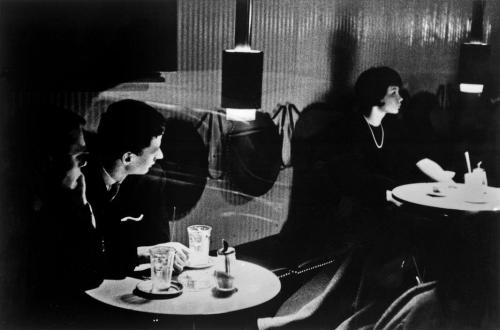
Café
René Burri
1961
_______________________
An absence of presence
Wisdom has it that we should try to live in the present. But what happens when the present is all we have, with no right to forget the past or to seek a better future? Such is the predicament of a modern world overwhelmed by choice and distraction, where living with real presence is hard work. Literary theorist Hans Gumbrecht explains the wrench of an ever-expanding present.
via Synthetic_zero
_______________________
The Quiddities
"Take this from this, if this be otherwise": an essay on literary minutiae.
Joe Milutis
Triple Canopy
(....)
How is it that a word so attuned to our presence in a single moment has led us to such a comedy of absence? Is there a way to return to the shock of our thisness in the world, after we’ve moved through the humbling uncertainties of these notable thises? After all, each this—digitized, arrayed, and quantified, as if in a gallery of pronominal butterflies—tells us very little about its life, even though it’s animated every time we eye it.
This dwells in the ephemeral; it passes. When not pinned down, it announces freedom from meaning and interpretation; it “designates, but keeps silent,” as Roland Barthes has written. So try as we might to classify that freedom, we are left without words. But is the presentist philosophy announced by every this ill equipped to fathom the very world that allows one to access and organize these instances? When we make this speak, from the depths of its massive archive, what is the terrible sound? Is it everything that literature seeks to avoid, or everything it seeks to say?
...(more)
_______________________
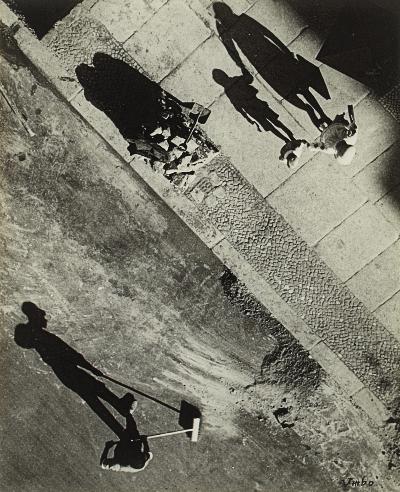
Mystery of the Street
1928
Otto Umbehr
(1902-1980)
_______________________
The Alchemy of the World:
Rimbaud and Revolutionary Artifice
Brian Kim Stefans
(....)
While Rexroth’s misgivings — written in the heat of the Beat moment in 1957 — offer a valuable demystification of the life and work of the poet, Brecht’s earlier assessment provides rich ground for a consideration of Rimbaud’s work in relation to political thought. This essay compares Rimbaud’s conception of the ‘alchemy of the word’ with Veronica Forrest-Thomson’s idea of the ‘image-complex’ as she describes it in her 1978 study Poetic Artifice. Forrest-Thomson’s book provides a critical language for much of what is only implied in Rimbaud’s poem, in that it describes in semi-technical language the space of ‘non-meaning’ in a poem in which the worlds inside and outside a poem meet, while at the same time maintaining these dichotomies of ‘inside’ and ‘outside’ — here and there — necessary for a theory of literary ‘alchemy.’ The work of American ‘language’ poets Charles Bernstein and Bruce Andrews is central to this argument, since their work is most singularly and directly concerned with the role the poet plays as arbiter of cultural values — whether as creator, destroyer, animator or aggravator.
...(more)
Journal of Poetics Research
_______________________
OWS People's Library and Jorge Luis Borges
Radical Politics, Heterotopic Spaces, and the Practice of Hope
Sherrin Frances
ctheory
(....)
The permanency that participants seemed to be working toward that fall signaled an optimism that understandably shifted after the November raid. Jaime Taylor and Zachary Loeb, two original OWS librarians, write that while the library had a steady stream of foot traffic and contributions before and after the raid, after November 15 visitors typically "came with lamentations over the loss of the library proper rather than with book donations." Stephen Boyer, another OWS librarian and the OWS Poetry Anthology editor, later said, "we were all heartbroken mid-November, when the NYPD came and squashed the park." The fast rise and fall of the original People's Library installation was disheartening and signaled in many ways a loss of hope--not only for those directly involved, but also for like-minded and sympathetic readers across the U.S.
Despite this abrupt and negative end, the emergence of the People's Library is much too meaningful to file away as a short-lived footnote within the OWS narrative. It is a complex, uncanny space, and a turn toward the similarly uncanny fiction of Jorge Luis Borges may help us to better understand its significance. Borges's work can be read as a metaphorical precursor to the People's Library. Metaphor, as Borges tells us, is the tool with which writers have traditionally "disordered the rigid universe," a disordering that the People's Library also seems to work toward. Borges's stories and the People's Library both embody a particular convergence of variables, and the spaces that emerge force important questions about distributions of power and coping mechanisms in the face of external, uncontrollable, political currents. A deeper understanding of the connection between Borges and the People's Library may even affect the structure of hope with which we face politics in the 21st century.
...(more)
_______________________
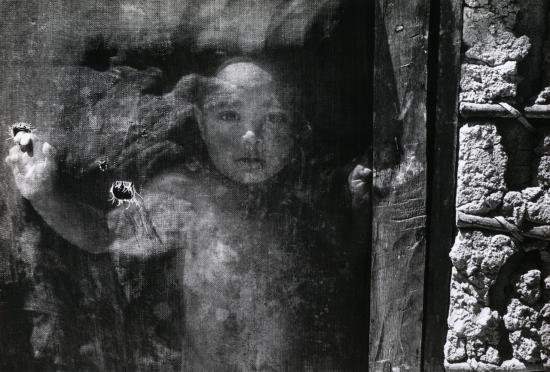
brazil, 1977
René Burri
1933 - 2014
_______________________
Frost at Midnight
Samuel Taylor Coleridge
b. Oct. 21, 1772
(....)
... Sea, hill, and wood,
With all the numberless goings-on of life,
Inaudible as dreams! the thin blue flame
Lies on my low-burnt fire, and quivers not;
Only that film, which fluttered on the grate,
Still flutters there, the sole unquiet thing.
Methinks its motion in this hush of nature
Gives it dim sympathies with me who live,
Making it a companionable form,
Whose puny flaps and freaks the idling Spirit
By its own moods interprets, every where
Echo or mirror seeking of itself,
And makes a toy of Thought.
(....)

Old timber yard
pre 1929
Harold Cazneaux
1878 - 1953
_______________________
Robert Walser: The Walk
from On Walking On
Cole Swensen
Forr Walser, a walk usually began by putting on a hat. Among a room of ghosts.
To the quiet end, if one could walk a lost. For Walser, to walk was to unfold
an origami bird as a door unfolds a world. If there was a child there, the sun spun,
and off he walked on that.
•
He knew that a planet, too, wanders, open, in a field of asters. And watched
the terror vanish, falling with the trees into darkness. You walk the dark to recall
a specific point in an argument in which you saw something delicate
fall apart. In fact, to pieces. Walser leaned down to pick something up from the
dusty road, and the dust, one by one, Walser thought the form of a road beautiful
in itself, citing that its joy exists outside of time, or rather beside it, so Walser
walked along the side of the road singing under his breath to the grass.
•
He thought a walk could be a masterpiece, which is a matter
of arrangement—the elements carefully chosen, a small hand,
another stand of trees, out of the corner of his eye, he saw
someone smiling. A walk brings things out, wraps them up
in glorious scents, holds them out at arms’ length and keeps
them there, just out of reach, perfecting the scene.
•
...(more)
_______________________
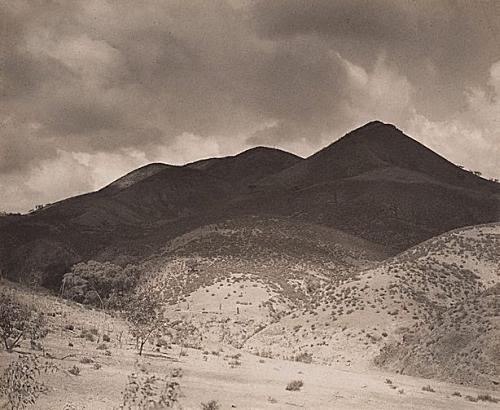
The shadowed hills: the Flinders Ranges
Harold Cazneaux
1935
_______________________
Variations on the Right to Remain Silent
Anne Carson
A Public Space
Silence is as important as words in the practice and study of translation. This may sound like a cliché. (I think it is a cliché. Perhaps we can come back to cliché.) There are two kinds of silence that trouble a translator: physical silence and metaphysical silence. Physical silence happens when you are looking at, say, a poem of Sappho’s inscribed on a papyrus from two thousand years ago that has been torn in half. Half the poem is empty space. A translator can signify or even rectify this lack of text in various ways—with blankness or brackets or textual conjecture—and she is justified in doing so because Sappho did not intend that part of the poem to fall silent. Metaphysical silence happens inside words themselves. And its intentions are harder to define. Every translator knows the point where one language cannot be translated into another. Take the word cliché. Cliché is a French borrowing, past participle of the verb clicher, a term from printing meaning “to make a stereotype from a relief printing surface.” It has been assumed into English unchanged, partly because using French words makes English-speakers feel more intelligent and partly because the word has imitative origins (it is supposed to mimic the sound of the printer’s die striking the metal) that make it untranslatable. English has different sounds. English falls silent. This kind of linguistic decision is simply a measure of foreignness, an acknowledgment of the fact that languages are not sciences of one another, you cannot match them item for item. But now what if, within this silence, you discover a deeper one—a word that does not intend to be translatable. ...(more)
via the page
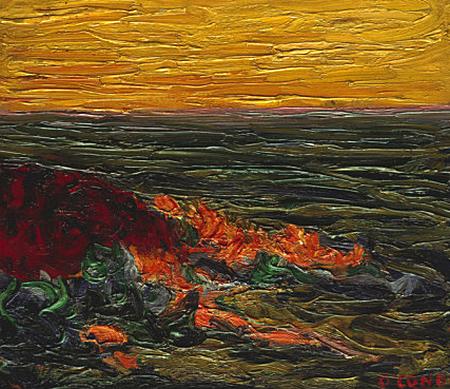
Seascape Yellow Sky Brittany
Roderic O'Conor
b. October 17, 1860
_______________________
The Meaning Of The Sea
Alexander Vvedensky
1904 - 1941
translated from the Russian by Alex Cigale
mayday
to understand it once and for all
one must live life as in reverse
and to take walks in the forest
while tearing out your hair whole
and when you get to know the fire
of the light bulb or of the oven
say to it why are you shining
you the fire are candle’s master
what’s your meaning is it nothing
where’s the kettle where the cabinet
the demons whirl around like flies
circling above a piece of pie
and these spirits flash their eyes
hands and legs and horns and smiles
around the trees juicy beasts howl
the light bulbs twisting in their sleep
the silent children blow their horns
old women cry atop the evergreens
and the universal deity
stands in the celestial cemetery
and the ideal horse saunters
until finally the forest enters
...(more)
_______________________

Yellow Landscape
1892
Roderic O'Conor
_______________________
Translation's homeopathic gesture
Erin Moure
(....)
The body responds, but cannot ever forget or avoid its cellular infarction, movement or life below conscious choice. Its response is different to different texts, and to the same text at different intervals. The text always demands something of the body seated in front of it; it urges something from that body.
As translator, I respond to the urge of the text, its urgency. This involves my mind, which, like any mind, is acculturated, constructed by the culture in which it lives. Tripwire. In the words of Giorgio Agamben, the process is one of subjectivization and of desubjectivization at the same time. It is a process that cannot be fully controlled by society, however, because it passes through a human body.
The homeopathic gesture that propels translation comes from the interior heat of a set of cells. Outside of any theory of translation, these cells function. They renew the fibres of their DNA. Proteins. In the moment of translation, there is no theory possible. Only this relation of light and cell which has a homeopathic influence on the language that results.
...(more)
_______________________
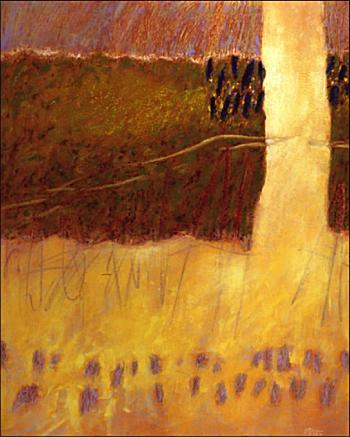
Roderic O'Conor
_______________________
From Thomas Bernhard’s novel Wittgenstein’s Nephew
Biblioklept
I do not care for walks either, and have been a reluctant walker all my life. I have always disliked walking, but I am prepared to go for walks with friends, and this makes them think I am a keen walker, for there is an amazing theatricality about the way I walk. I am certainly not a keen walker, nor am I a nature lover or a nature expert. But when I am with friends I walk in such a way as to convince them I am a keen walker, a nature lover, and a nature expert. I know nothing about nature. I hate nature, because it is killing me. I live in the country only because the doctors have told me that I must live in the country if I want to survive—for no other reason. In fact I love everything except nature, which I find sinister; I have become familiar with the malignity and implacability of nature through the way it has dealt with my own body and soul, and being unable to contemplate the beauties of nature without at the same time contemplating its malignity and implacability, I fear it and avoid it whenever I can. The truth is that I am a city dweller who can at best tolerate nature. It is only with reluctance that I live in the country, which on the whole I find hostile.
_______________________
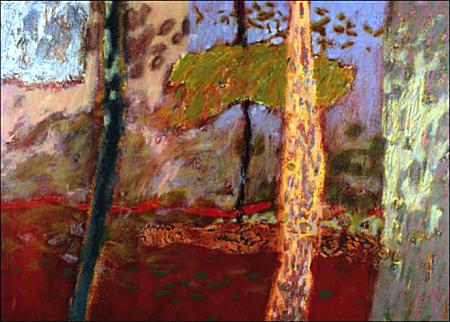
Roderic O'Conor
_______________________
Brooke Ellsworth’s Thrown: A Translation
Justin Sherwood
entropy
Translation isn’t only the process of converting words or text from one language to another. Translation is transformation. In Thrown: A Translation, poet Brooke Ellsworth explores the myriad ways we convey both classic myths and ourselves. Drawing on the Roman poet Ovid’s tale of Echo and Narcissus, Ellsworth begins to delineate her multivarious take on translation in the first poem of the collection, “In Nova,” the reader’s guide to her chapbook. “Nova,” the feminine of “novus,” is Latin for “new star,” an extant star that shines brightly to declare its apparent newness only to fade out and return to its original form.
...(more)
_______________________
from The Circle's Spell
Marcelo Morales Cintero
translated from the Spanish by Kristin Dykstra
(....)
Writing things is the way to release oppression from the idea of death, of anonymity.
I write because I'm going to die. Sometimes in life I'm inside scenes, I move through dirty hallways, make my way through puddles in streets. Eyes reviewing reality, I don't know how long I'll look at these surfaces. It's too strange for existence.
Photography tenses light. This is the poem too. The great moments are impressions, like Hume's flame. We recall intensity. That's it in the end: life. Moments of tension. The rest a great calm equal to a great nothingness. To a death you forget.
I came to a realization today when I walked into the kitchen. Things acquired the status of symbols, which happens in my life when things enter a poetic state. In those moments I'm a stranger.
For me poetry is only possible as fragment, as tension. Like the flash from a camera, like the photo resolving out of light printed on darkness.
I think about the unbelievable web of presences that precede my own. The infinite connectivity of events and lives making it possible for me to take forward steps. To see a building's dirty walls, an ugly park between two houses. Life has the aura of a miracle. I don't know, won't ever know if it's accidental or not. There's no way to find out. In these cases a yes is worth the same as a no.
...(more)
Asymptote - October 2014
|
